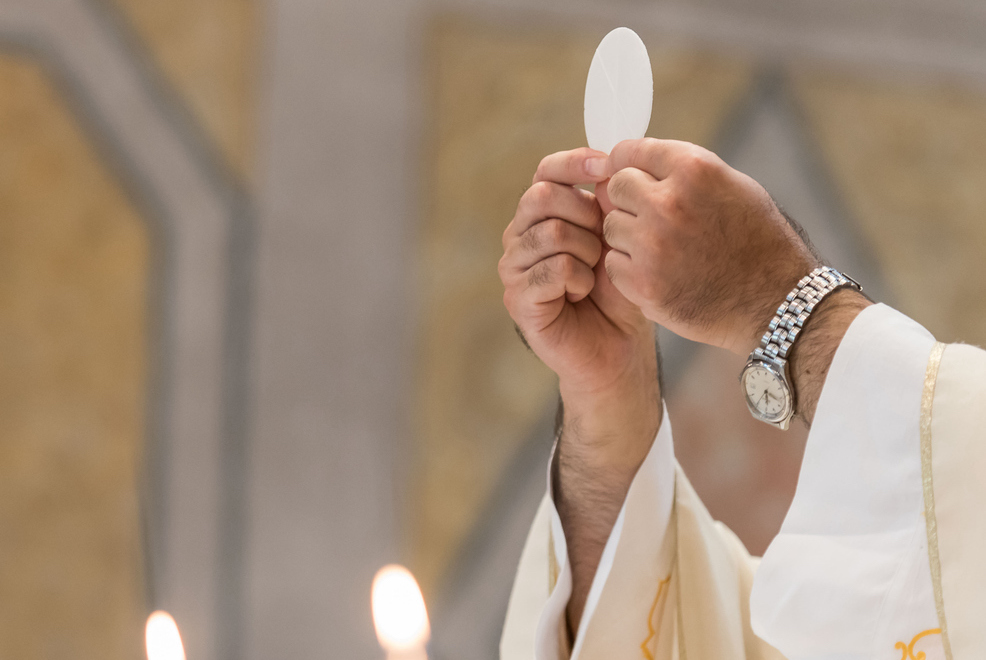Several years ago, a man approached me with a compliment. He wasn’t Catholic but often came to Mass anyway. He said, “Father, when you get up on the stage and talk about God, I always learn a lot. Thank you!”
I appreciated it, but it still troubles me. To his credit, he probably wasn’t familiar with some peculiar Catholic terminology. Even so, do people ever think I’m on stage? A stage is where people perform. They take on roles, acting differently than who they really are.
If you go to the theater, then you know what’s happening on stage is fake. An actor might look like Shakespeare or Aretha Franklin, but you know it’s just somebody pretending.
Certainly, what happens in the Mass is not pretend. We can count on the total and absolute reality of what happens on the altar. We take Jesus at his word when he says: “Take it; this is my body,” and then, “This is my blood of the covenant, which will be shed for many” (Mk 14:22, 24). He doesn’t say, “This appears to be my body” or “I’m pretending that this is my blood.” It truly is, in a real, authentic and substantive way.
If what happens at Mass is different than what happens on a stage, then our attitude must also be very different. When we go to the movies, a theater or a concert, we expect to be entertained. We sit and watch, expecting the performers to impress us, that they’ll make it worth our while.
But if that’s the same attitude we bring to Church, then we need an attitude adjustment. Watching a movie, we reasonably think, “OK, George Clooney, what can you do for me?” but at Mass, we properly think, “Lord Jesus, what can I do for you?”
We gather in Church for liturgy, which comes from a Greek word that roughly translates as work. This is the work we do to praise, honor and worship the God who purchased our salvation with his blood. There is nothing more that he needs to do for us, so this is about what we do for him.
At the Second Vatican Council, the assembled bishops of the world reminded us in the Constitution on the Sacred Liturgy that “all the faithful should be led to that fully conscious, and active participation in liturgical celebrations which is demanded by the very nature of the liturgy” (14).
Fully conscious and active participation means that ordained priests offer Mass in a particular way, but through their baptismal priesthood, all Catholics participate in the sacrifice of the Mass. Liturgy is not a spectator sport.
If you find that you’re not getting much out of Mass, ask yourself what you’re putting into it. When we put in the work to empty our hearts, certainly God fills them with exactly what he knows we need.
Recently Bishop Knestout and other bishops in our region restored the obligation to attend Mass. That’s important, but I’m more interested in hunger than in obligation. Are we hungry for the Body and Blood of Jesus, to participate in the eucharistic sacrifice?
Or are we hungry for something or somebody else? It’s Jesus — and only Jesus — who will satisfy the deepest longings of our hearts and souls.
Since May, the Diocesan Evangelization Commission has been discussing topics like this. Bishop Knestout has asked us to consider how the diocese can empower parishes, who in turn can empower parishioners, to be agents of evangelization, helping to reconnect others with the Eucharist after months of distance and separation.
We hope to provide some resources this fall, but for now, please join us in reflecting on your relationship with Christ in the Eucharist. As we hear the “Bread of Life” discourses at weekend Masses on July 25, August 1 and 8, we’ll have a special opportunity to focus on this. If we have the chance to participate in the change of ordinary bread and wine into the actual Body and Blood of Christ, why would we be anywhere else?
Father Goertz is pastor of Our Lady of Lourdes, Richmond, and head of the Diocesan Evangelization Commission.

